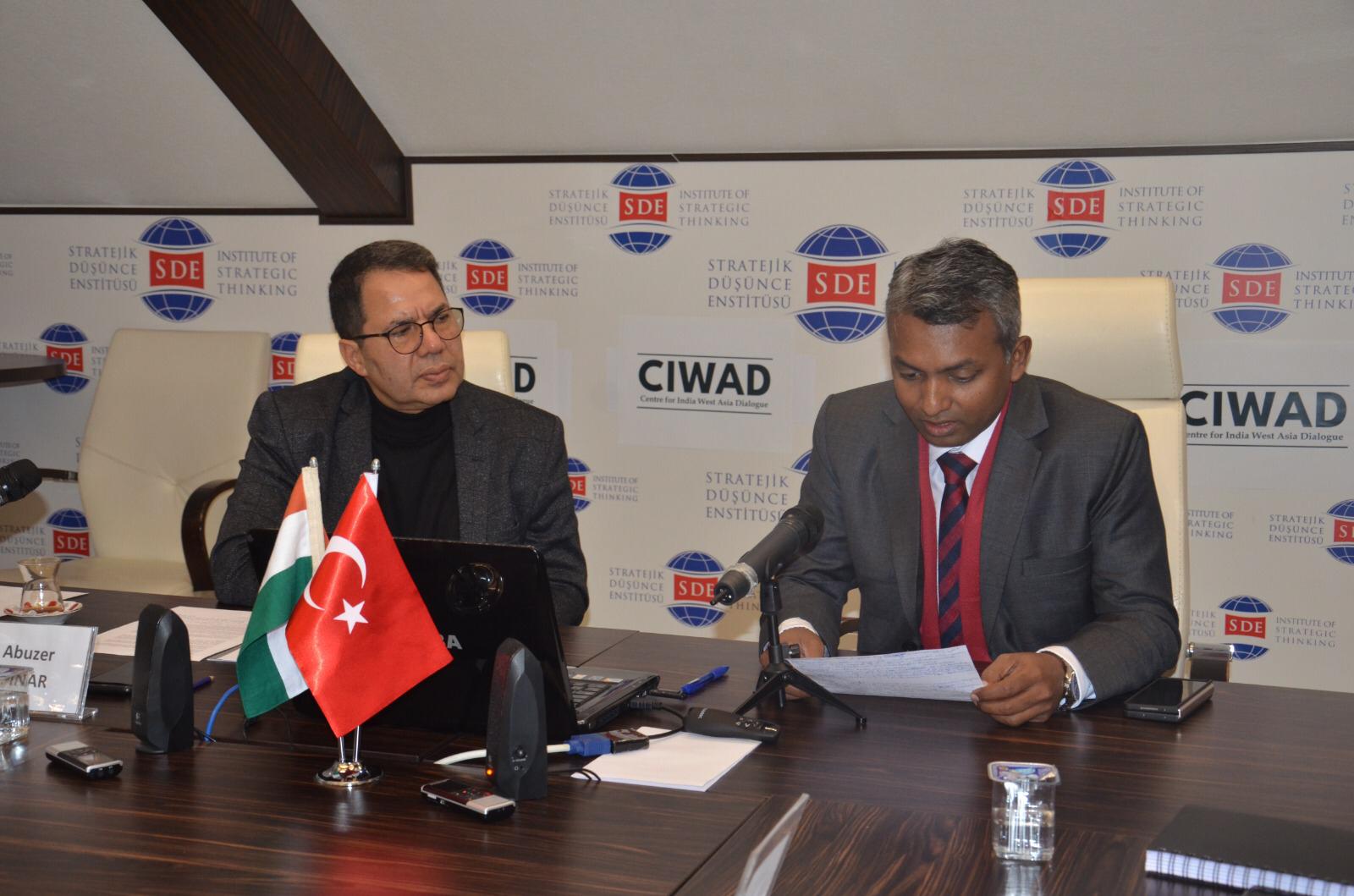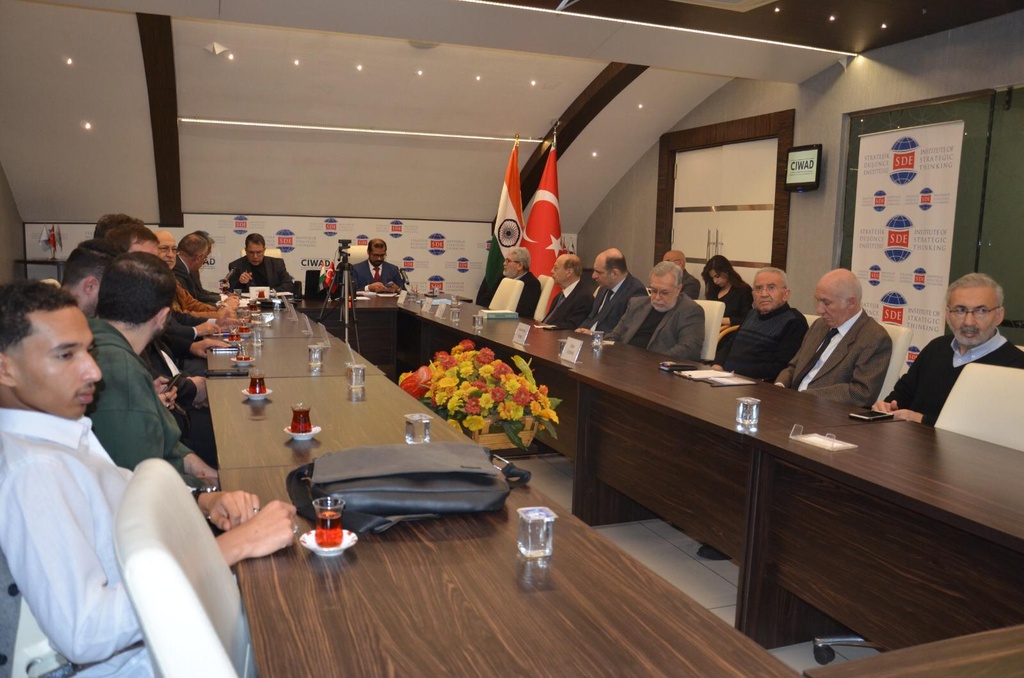
Leading thinkers, retired diplomats, and scholars from India and Turkey exchanged their views and perspectives on global and regional issues to explore where and how India and Turkiye have been advancing their international relations.
Ankara-based Institute of Strategic Thinking (SDE) hosted a dialogue with the New Delhi-based Centre for India West Asia Dialogue on “Indian and Turkish Perspectives on Global Order: Building Partnerships in a Changing World.”

Indian academician Dr. Omair Anas from Ankara Yıldırım Beyazıt University pointed out that it is important for an Indian think tank and Turkish think tanks to hold a dialogue to share their perspectives on issues that are important for both countries and people, and said: “Of course there is a greater role for diplomacy, but we have a greate responsibility at the people level and at the think tank level to exchange these thoughts and dialogues between each other."
Eminent Indian scholar and strategic affairs expert Dr. C Raja Mohan said India's relations are changing rapidly as its economy rises while Western economies face multiple crises. The shift in global capital - geopolitics and global finance – has brought India a new role. Most important among them is an opportunity for a multipolar world. Middle powers like India and Turkey have risen, but they have their own vulnerabilities. Even the global south is no longer a coherent body as they have deep economic and political clashes. Multilateralism is in crisis. So, India is exploring plurilateralism while the UN shows no signs of reforms for inclusiveness.
Director of SDE, Prof. Dr. Abuzer Pınar, welcomed the dialogue as both “India and Turkey need a new social model where all ethnic groups can live together, reflecting India’s G20 theme of "Vasudhaiva Kutumbakam” or “The World Is One Family.” Retired Indian Ambassador Anil Trigunayat underlined that Turkey has an important role in convincing countries of South Asia to cooperate on terrorism. India and Turkey have shared interests on many issues, including climate issues, global reforms, and international security.

SDE’s Sinan Tavukcu argued that India-Türkiye relations couldn’t develop sufficiently due to many issues, including their different perspectives, on India-Pak tensions over Jammu and Kashmir. Türkiye supports the implementation of the UN resolution on the Kashmir issue, while India considers the Kashmir issue an internal affair. However, today China and India are the centres of global trade. Turkish foreign policy today is developing around the global trade routes, geopolitical choke points, and middle and maritime Silk Road. Turkey now supports its Central Asian states’ stability and security. In this context, the exclusion of Türkiye from India's Middle East Economic Corridor announced at the last G20 is a matter of concern. Also, it is viewed that the India-Pakistan rivalry largely shapes India’s foreign policy, and India observes Türkiye from this perspective. To this, Major General Dr Güray Alpar maintained that Türkiye’s relations with Pakistan do not affect the successful development of India-Türkiye relations. Both countries have shared interests in several geographies, including Africa and Central Asia.
Dr. Avinash Godbole of Jindal Global University in India, however, added that- Pakistan is no longer the center of India's foreign policy, as it used to be a few decades ago. Today, China is one of India's most important strategic interests. India wants to avoid a unipolar Asia, a view to which Türkiye has a common understanding. In Central Asia, both India and Türkiye favour regional stability and security. Retired Ambassador Numan Hazar recalled the warm relations India and Türkiye shared during the time of President Turgut Özal and Prime Minister Rajiv Gandhi in the 1980s. Türkiye, despite choosing NATO for its immediate security concerns from the Soviet Union, Türkiye was vocal against imperialism. It wanted to deepen relations with India during the time of Prime Minister Jawaharlal Nehru. He also underscored India's advancements in areas such as science, technology, and literature, and democratic values offered a huge landscape of cooperation.
The director of the Centre for India West Asia Dialogue, Professor Aftab Kamal Pasha, concluded the discussion with optimism that Western policies have failed in providing security and stability in all regions while India and Türkiye could cooperate beyond their bilateral interests for international security and stability. He cautioned that differences on some issues should not arrest the progress and growth of overall relations.
The Counsellor of the Indian Embassy in Ankara, Anto Alphonse, joined the dialogue at the SDE headquarters in Ankara and welcomed the initiative of dialogue between the Indian and Turkish think tanks. He expressed the hope that there will be more such dialogues and exchange of perspectives between our Indian and Turkish scholars and institutions.
Referring to the historical ties between Turkey and India and the good relations during the Ottoman period, researcher-writer Mehmet Öztürk said, "Today, we must strengthen ties with India from state to state, government to government and people to people."
Diğer İçerikler